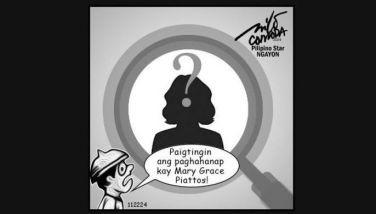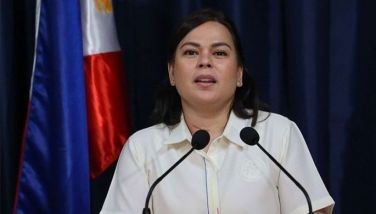Free speech

August 26, 2006 | 12:00am
Yesterday, Sigaw ng Bayan and Ulap presented their petition for a Charter change proposal to the COMELEC with the signatures required by the Constitution. To me, this is déjà vu. I was, after all, one of those who presented the first people’s initiative in 1997.
Many are bewildered that a people’s initiative should be attempted again when the Supreme Court had turned it down then. Why do it again? As one who had been there, the answer is simple. It needs to be done. The personae and circumstances may be different, but the underlying plot remains. It is about the status quo unwilling to give way to change.
Lucky for us, that in today’s action, the past gives us also the guideposts. When the Supreme Court tossed out the people’s initiative in 1997, two justices wrote separate opinions dissenting with the majority. If I return again and again to Justice Artemio Panganiban and Justice Reynato Puno it is because their dissenting opinions remain our beacons for today’s endeavor.
Many are unaware that the Supreme Court contended with two issues in the Santiago vs. Comelec case: one was the initiatory petition by a citizen named Jesus Delfin. He was testing the waters, hoping that he could use the rules and implementing details of Comelec Resolution 2300 to initiate a people’s initiative. The other was on the issue of people’s initiative as a principle and whether it could be done.
The justices unanimously rejected the Delfin petition. Without the required signatures, his initiative was fatally flawed. Having shot down a citizen’s attempt to seek the help of the COMELEC through the rules it promulgated, the majority went further and proceeded to foreclose any attempt for a future People’s Initiative. That we must question. Did the Supreme Court have the right to do what it did in 1997?
Here, Justice Panganiban’s dissenting opinion guides us with his wise words, " Under the above restrictive holding espoused by the Court’s majority, the Constitution cannot be amended at all through a people’s initiative. Not by Delfin, not by Pirma, not by anyone, not even by all the voters of the country acting together. This decision will effectively but unnecessarily curtail, nullify, abrogate and render inutile the people’s right to change the basic law. At the very least, the majority holds the right hostage to congressional discretion on whether to pass a new law to implement it, when there is already one existing at present. This right to amend through initiative, it bears stressing, is guaranteed by Section 2, Article XVII of the Constitution."
At the press conference held last Thursday in Manila Hotel, someone asked whether the COMELEC certificates verifying the signatures were secured. It evoked a big laugh from those present. But it is not so funny when we think that over the years, people’s initiative was effectively hijacked by public institutions created by the people to guard their sovereignty.
Time and again, critics claim they merely echo the Supreme Court without even reading the fine points it brought out. The majority decision said plainly there is an enabling law but added it was inadequate. It also tied the hands of the Comelec, forbidding it to implement Resolution No. 2300, the rules and regulations on the conduct of initiative on amendments to the Constitution."
Justices Panganiban, Puno, Francisco concurred with the majority on the Delfin petition and agreed that until and unless a petition was accompanied by the required number of signatures — 12% of all the registered voters in the Philippines and at least 3% in every legislative district the Comelec cannot entertain any petition.
Justice Panganiban in unambiguous words wrote that the majority’s position was too sweeping and all too extremist. "It is equivalent to burning the whole house to exterminate the rats, and to killing the patient to relive him of pain. But he also said that "we should not thereby preempt any future effort to exercise the right of initiative correctly and judiciously." If we do not correct the mistake, we would be willing conspirators to strike at the very heart of our chosen way of life of freedom and democracy. For me these are the key words in Panganiban’s dissenting opinion. It is our duty as sovereign citizens of a democratic society to take his words seriously.
Together and implemented properly, RA 6735 (authored by the late Senator Raul Roco) and Comelec Resolution 2300 are sufficient to implement constitutional initiatives. The records are available to verify this, both in Congress and the Comelec for a serious and sincere student of people’s initiative.
All eyes will be on the COMELEC in the next few days. Will it heed the sovereign people’s petition or will it succumb to the machinations of vested interests against Charter change? Here again the electoral body should heed Justice Panganiban. Since no law can completely and absolutely cover all administrative details, RA 6735 "wisely empowered" the Commission on Election "to promulgate such rules and regulations as may be necessary to carry out the purposes of this Act." Following that law the Comelec issued Resolution 2300 on 16 January 1991 to govern the conduct of initiative. Therefore, if the Court accepts R.A. 6735 as the enabling law, whether it was adequate or not, it must also accept Resolution 2300 because the two were inevitably linked.
Finally and more importantly Panganiban says "the right to propose amendments to the Constitution is a species of the right of free speech and free assembly." On that there can be no hedging or compromise. Paradoxically, some of the very people who had made possible the writing of the 1987 Constitution, heroes all of EDSA People Power are the very same people who would have nothing of it. The People’s Initiative was precisely enshrined by the 1987 Constitution as the enduring legacy of EDSA 1. The highest duty of a sovereign people is to participate in writing the basic law of the land.
Not enough can be said of the wrong that was done in 1997 and we must make sure that it does not happen again The People’s Initiative petition is an exercise of free speech and therefore cannot be rightfully stopped even by the highest court if we claim we are a democracy. Here, Justice Panganiban used strong words and reminded the majority that it blatantly disregards "the rule cast in concrete that the letter of the law must yield to its spirit for the letter of the law is its body but its spirit is its soul."
A people’s initiative is merely a proposal and does not in anyway amend the Constitution. What will do that is a plebiscite, when the entire Filipino nation votes whether they are for or against the proposed amendment. The task of our public officials, both the COMELEC and the Supreme Court, is to uphold the right of freedom of speech. That right is not embodied only by our Constitution but it is a human right guaranteed by the Universal Declaration of Human Rights.
My email is [email protected]
Many are bewildered that a people’s initiative should be attempted again when the Supreme Court had turned it down then. Why do it again? As one who had been there, the answer is simple. It needs to be done. The personae and circumstances may be different, but the underlying plot remains. It is about the status quo unwilling to give way to change.
Lucky for us, that in today’s action, the past gives us also the guideposts. When the Supreme Court tossed out the people’s initiative in 1997, two justices wrote separate opinions dissenting with the majority. If I return again and again to Justice Artemio Panganiban and Justice Reynato Puno it is because their dissenting opinions remain our beacons for today’s endeavor.
Many are unaware that the Supreme Court contended with two issues in the Santiago vs. Comelec case: one was the initiatory petition by a citizen named Jesus Delfin. He was testing the waters, hoping that he could use the rules and implementing details of Comelec Resolution 2300 to initiate a people’s initiative. The other was on the issue of people’s initiative as a principle and whether it could be done.
The justices unanimously rejected the Delfin petition. Without the required signatures, his initiative was fatally flawed. Having shot down a citizen’s attempt to seek the help of the COMELEC through the rules it promulgated, the majority went further and proceeded to foreclose any attempt for a future People’s Initiative. That we must question. Did the Supreme Court have the right to do what it did in 1997?
Here, Justice Panganiban’s dissenting opinion guides us with his wise words, " Under the above restrictive holding espoused by the Court’s majority, the Constitution cannot be amended at all through a people’s initiative. Not by Delfin, not by Pirma, not by anyone, not even by all the voters of the country acting together. This decision will effectively but unnecessarily curtail, nullify, abrogate and render inutile the people’s right to change the basic law. At the very least, the majority holds the right hostage to congressional discretion on whether to pass a new law to implement it, when there is already one existing at present. This right to amend through initiative, it bears stressing, is guaranteed by Section 2, Article XVII of the Constitution."
At the press conference held last Thursday in Manila Hotel, someone asked whether the COMELEC certificates verifying the signatures were secured. It evoked a big laugh from those present. But it is not so funny when we think that over the years, people’s initiative was effectively hijacked by public institutions created by the people to guard their sovereignty.
Time and again, critics claim they merely echo the Supreme Court without even reading the fine points it brought out. The majority decision said plainly there is an enabling law but added it was inadequate. It also tied the hands of the Comelec, forbidding it to implement Resolution No. 2300, the rules and regulations on the conduct of initiative on amendments to the Constitution."
Justices Panganiban, Puno, Francisco concurred with the majority on the Delfin petition and agreed that until and unless a petition was accompanied by the required number of signatures — 12% of all the registered voters in the Philippines and at least 3% in every legislative district the Comelec cannot entertain any petition.
Justice Panganiban in unambiguous words wrote that the majority’s position was too sweeping and all too extremist. "It is equivalent to burning the whole house to exterminate the rats, and to killing the patient to relive him of pain. But he also said that "we should not thereby preempt any future effort to exercise the right of initiative correctly and judiciously." If we do not correct the mistake, we would be willing conspirators to strike at the very heart of our chosen way of life of freedom and democracy. For me these are the key words in Panganiban’s dissenting opinion. It is our duty as sovereign citizens of a democratic society to take his words seriously.
Together and implemented properly, RA 6735 (authored by the late Senator Raul Roco) and Comelec Resolution 2300 are sufficient to implement constitutional initiatives. The records are available to verify this, both in Congress and the Comelec for a serious and sincere student of people’s initiative.
All eyes will be on the COMELEC in the next few days. Will it heed the sovereign people’s petition or will it succumb to the machinations of vested interests against Charter change? Here again the electoral body should heed Justice Panganiban. Since no law can completely and absolutely cover all administrative details, RA 6735 "wisely empowered" the Commission on Election "to promulgate such rules and regulations as may be necessary to carry out the purposes of this Act." Following that law the Comelec issued Resolution 2300 on 16 January 1991 to govern the conduct of initiative. Therefore, if the Court accepts R.A. 6735 as the enabling law, whether it was adequate or not, it must also accept Resolution 2300 because the two were inevitably linked.
Finally and more importantly Panganiban says "the right to propose amendments to the Constitution is a species of the right of free speech and free assembly." On that there can be no hedging or compromise. Paradoxically, some of the very people who had made possible the writing of the 1987 Constitution, heroes all of EDSA People Power are the very same people who would have nothing of it. The People’s Initiative was precisely enshrined by the 1987 Constitution as the enduring legacy of EDSA 1. The highest duty of a sovereign people is to participate in writing the basic law of the land.
Not enough can be said of the wrong that was done in 1997 and we must make sure that it does not happen again The People’s Initiative petition is an exercise of free speech and therefore cannot be rightfully stopped even by the highest court if we claim we are a democracy. Here, Justice Panganiban used strong words and reminded the majority that it blatantly disregards "the rule cast in concrete that the letter of the law must yield to its spirit for the letter of the law is its body but its spirit is its soul."
A people’s initiative is merely a proposal and does not in anyway amend the Constitution. What will do that is a plebiscite, when the entire Filipino nation votes whether they are for or against the proposed amendment. The task of our public officials, both the COMELEC and the Supreme Court, is to uphold the right of freedom of speech. That right is not embodied only by our Constitution but it is a human right guaranteed by the Universal Declaration of Human Rights.
BrandSpace Articles
<
>
- Latest
- Trending
Trending
Latest
Latest
Recommended

November 21, 2024 - 12:00am




























